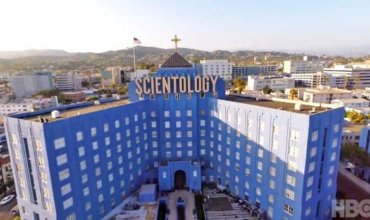AD ASTRA is a big budget science fiction movie that stars Brad Pitt in the role of Major Roy McBride. It is set in the near-future and McBride is part of the United States Space Command, colloquially referred to as SpaceCom. He is the son of the famous Clifford McBride (Tommy Lee Jones) who, years ago, travelled to the farthest edge of our solar system on a mission to discover signs of extra-terrestrial intelligence. Whether the older McBride is still out there is a subject of much speculation, because there have been massive power surges emanating from that part of space where he was last known to be.
SpaceCom orders Major McBride to travel to Mars to send a message to his father and possibly discover the source of the potentially life-threatening interplanetary space surges. His mission is mostly secret, so as not to create panic. As the junior McBride travels to the Moon and then on to Mars, we are shown a future where humanity has spread out through the nearer planets and their moons and constructed impressive technology such as the International Space Antenna. We are exposed to McBride’s inner-monologue and discover that he doesn’t remember his father particularly well or fondly. Clifford left when Roy was only 16-years-old and he remembers a rather strict and distant man. Roy’s external mission has wide implications, however he is more occupied by thoughts about a man whom he hasn’t seen for most of his life.
AD ASTRA is a well-executed science fiction film with extremely high production values. As an extrapolation of current space technology, it convinces. It envisages where the work of NASA and US space program will lead. In this version of the future, Richard Branson and Elon Musk-type multi-billionaire figures have also commercialised space travel and exploration.
Brad Pitt’s Roy McBride is a layered and restrained portrayal of a man who has achieved much, despite struggling with long-term psychological issues. In this 124-minute movie, much of its length is spent observing the universe through the experiences of McBride; Pitt is well up to the challenge of the nuance this requires.
AD ASTRA has been compared to 2001: A SPACE ODDYSEY (1968), SOLARIS (1972), GRAVITY (2013), INSTERSTELLAR (2014) and even has moments that seem to pay homage to several of these movies. However, it has mostly been compared with APOCALYPSE NOW (1979) in terms of its journey to find the older McBride. Comparisons can also be drawn with Terrence Malick’s TREE OF LIFE, which Pitt was also in.
There has been much acclaim for AD ASTRA, marking it as a stunning, insightful and brilliant exploration space and humanity. Yet, this critical darling didn’t connect with me. I found the movie overlong, pretentious and tedious. I saw it as a brilliantly visualised art film, broken up with silly adventure sequences and stitched together with way too much Brad Pitt voiceover. The core of the story is the McBride father-son relationship, a great deal of time is invested here, which didn’t pay off with greater insight into Clifford or Roy.
Director and co-writer James Gray has shot for the stars and for many audience members has achieved an epic space film that is dense with meaning. Consider seeing this film if you want to enjoy a smörgåsbord of images and ideas and are not too concerned with a tight narrative structure. My rating (6/10).


